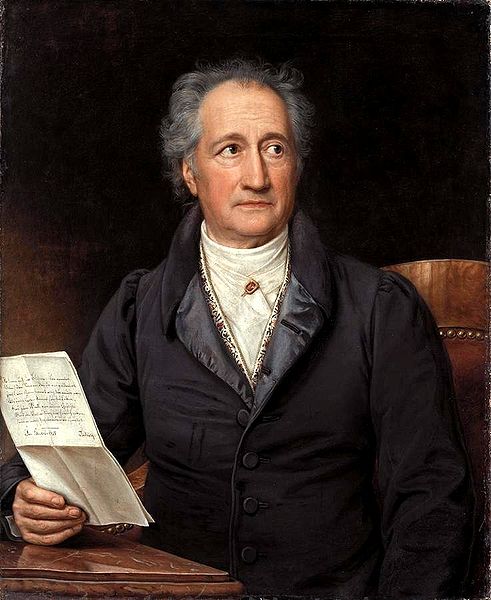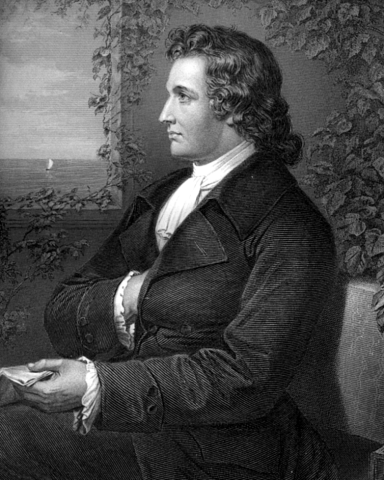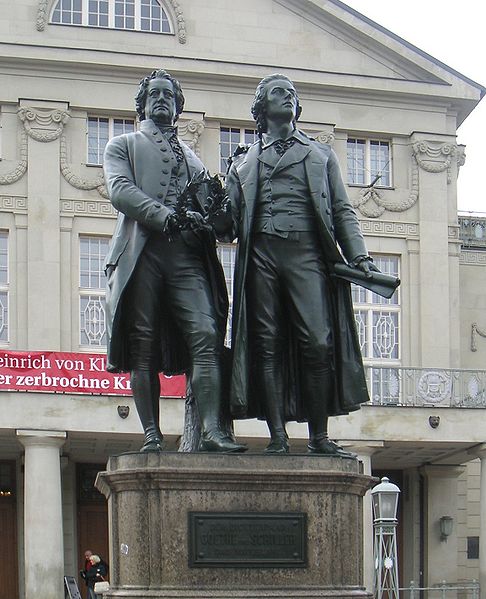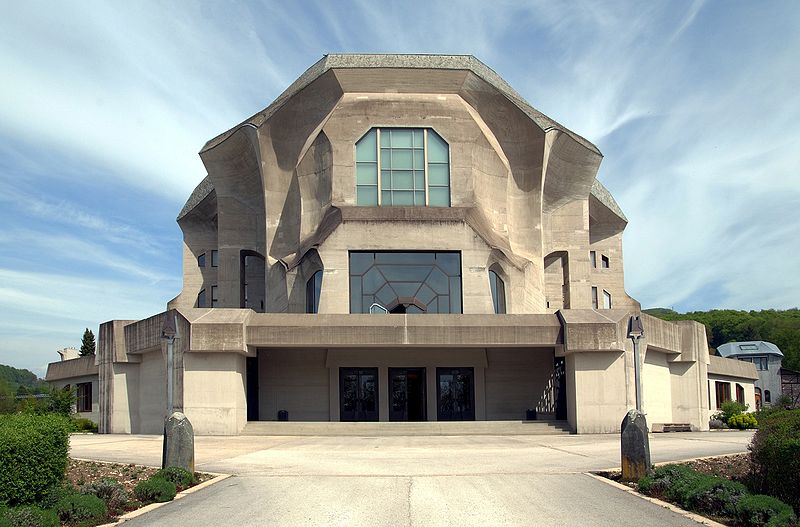<Back to Index>
- Engineer and Architect Vladimir Grigoryevich Shukhov, 1853
- Writer and Philosopher Johann Wolfgang von Goethe, 1749
- Prime Minister of Canada Paul Edgar Philippe Martin, 1938


Johann Wolfgang von Goethe (28 August 1749 – 22 March 1832) was a German writer and polymath. Goethe's works span the fields of poetry, drama, literature, theology, philosophy, pantheism, and science. His magnum opus, lauded as one of the peaks of world literature, is the two-part drama Faust. Goethe's other well-known literary works include his numerous poems, the Bildungsroman Wilhelm Meister's Apprenticeship and the epistolary novel The Sorrows of Young Werther.
Goethe was one of the key figures of German literature and the movement of Weimar Classicism in the late 18th and early 19th centuries; this movement coincides with Enlightenment, Sentimentality (Empfindsamkeit), Sturm und Drang and Romanticism. The author of the scientific text Theory of Colours, his influential ideas on plant and animal morphology and homology were extended and developed by 19th century naturalists including Charles Darwin. He also served at length as the Privy Councilor ("Geheimrat") of the duchy of Weimar. Goethe is the originator of the concept of Weltliteratur ("world literature"), having taken great interest in the literatures of England, France, Italy, classical Greece, Persia, the Arab world, and others. His influence on German philosophy is virtually immeasurable, having major effect especially on the generation of Hegel and Schelling, although Goethe himself expressly and decidedly refrained from practicing philosophy in the specialized sense. Goethe's influence spread across Europe, and for the next century his works were a major source of inspiration in music, drama, poetry and philosophy. Goethe's father, Johann Caspar Goethe (Frankfurt am Main, Hessen, 29 July 1710 – Frankfurt, 25 May 1782), lived with his family in a large house in Frankfurt, then an Imperial Free City of the Holy Roman Empire.
Goethe's mother, Catharina Elisabeth Textor (Frankfurt, 19 February
1731 – Frankfurt, 15 September 1808), the daughter of the Mayor of
Frankfurt Johann Wolfgang Textor (Frankfurt, 11 December 1693 –
Frankfurt, 6 February 1771) and wife (married at Wetzlar, 2 February 1726) Anna Margaretha Lindheimer (Wetzlar, 23 July 1711 – Frankfurt, 18 April 1783, a descendant of Lucas Cranach the Elder and
Henry III, Landgrave of Hesse-Marburg), married 38-year-old Johann
Caspar when she was 17 at Frankfurt on 20 August 1748. All their
children, except for Goethe and his sister, Cornelia Friederike
Christiana, who was born in 1750, died at early ages. Johann Caspar and private tutors gave Goethe lessons in all the common subjects of that time, especially languages (Latin, Greek, French and English). Goethe also received lessons in dancing, riding and fencing.
Johann Caspar was the type of father who, feeling frustrated in his own
ambitions by what he saw as a deficiency of educational advantages, was
determined that his children would have all those advantages which he
had not had. Goethe had a persistent dislike of the church, characterizing its history as a "hotchpotch of fallacy and violence" (Mischmasch von Irrtum und Gewalt). His great passion was drawing. Goethe quickly became interested in literature; Friedrich Gottlieb Klopstock and Homer were among his early favourites. He had a lively devotion to theatre as well and was greatly fascinated by puppet shows that were annually arranged in his home; a familiar theme in Wilhelm Meister's Apprenticeship. Goethe studied law in Leipzig from
1765 to 1768. Learning age-old judicial rules by heart was something he
strongly detested. He preferred to attend the poetry lessons of Christian Fürchtegott Gellert. In Leipzig, Goethe fell in love with Käthchen Schönkopf and wrote cheerful verses about her in the Rococo genre. In 1770, he anonymously released Annette, his first collection of poems. His uncritical admiration for many contemporary poets vanished as he became interested in Lessing and Wieland. Already at this time, Goethe wrote a good deal, but he threw away nearly all of these works, except for the comedy Die Mitschuldigen. The restaurant Auerbachs Keller and its legend of Faust's 1525 barrel ride impressed him so much that Auerbachs Keller became the only real place in his closet drama Faust Part One. Because his studies did not progress, Goethe was forced to return to Frankfurt at the close of August 1768. In
Frankfurt, Goethe became severely ill. During the year and a half that
followed, because of several relapses, the relationship with his father
worsened. During convalescence, Goethe was nursed by his mother and
sister. Bored in bed, he wrote an impudent crime comedy. In April 1770,
his father lost his patience; Goethe left Frankfurt in order to finish
his studies in Strasbourg. In Alsace,
Goethe blossomed. No other landscape has he described as affectionately
as the warm, wide Rhine area. In Strasbourg, Goethe met Johann Gottfried Herder,
who happened to be in town on the occasion of an eye operation. The two
became close friends, and crucially to Goethe's intellectual
development, it was Herder who kindled his interest in Shakespeare, Ossian and
in the notion of Volkspoesie (folk poetry). On October 14, 1772 he held
a speech in his parental home in honour of the first German
"Shakespeare Day". His first meeting with Shakespeare's works is
described as his personal awakening in literature. On
a trip to the village Sesenheim, Goethe fell in love with Friederike
Brion, but, after a couple of weeks, terminated the relationship. Several of his poems, like Willkommen und Abschied, Sesenheimer Lieder and Heideröslein, originate from this time. At the end of August 1771, Goethe was certified as a licensee in Frankfurt. He wanted to make the jurisdiction progressively
more humane. In his first cases, he proceeded too vigorously, was
reprimanded and lost the position. This prematurely terminated his
career as a lawyer after only a few months. At this time, Goethe was
acquainted with the court of Darmstadt, where his inventiveness was praised. From this milieu came Johann Georg Schlosser (who was later to become his brother-in-law) and Johann Heinrich Merck.
Goethe also pursued literary plans again; this time, his father did not
have anything against it, and even helped. Goethe obtained a copy of the biography of a noble highway man from the Peasants' War. In a couple of weeks the biography was reworked into a colourful drama. Entitled Götz von Berlichingen, the work went directly to the heart of Goethe's contemporaries. Goethe
could not subsist on being one of the editors of a literary periodical
(published by Schlosser and Merck). In May 1772 he once more began the
practice of law at Wetzlar. In 1774 Goethe wrote the book which would bring him worldwide fame, The Sorrows of Young Werther. Despite the immense success of Werther,
it did not bring Goethe much financial gain – copyright law at the
time being essentially nonexistent. (In later years Goethe would bypass
this problem by periodically authorizing "new, revised" editions of his Complete Works.) In 1775, Goethe was invited, on the strength of his fame as the author of The Sorrows of Young Werther, to the court of Carl August, Grand Duke of Saxe-Weimar-Eisenach. (The Duke at the time was 18 years of age, to Goethe's 26.) Goethe thus went to live in Weimar,
where he remained for the rest of his life and where, over the course
of many years, he held a succession of offices, becoming the Duke's
chief adviser. Goethe,
aside from official duties, was also a friend and confidant to the
Duke, and participated fully in the activities of the court. For
Goethe, his first ten years at Weimar could well be described as a
garnering of a degree and range of experience which perhaps could be
achieved in no other way. Goethe was ennobled in 1782 (this being indicated by the "von" in his name). During
Goethe's term of office as a member of the Geheime Consilium, the top
deliberative circle of the Duke Carl August of Saxony-Weimar, there
were three cases of the killing of a newborn infant by its mother.
Whereas in 1781 Dorothea Altwein was sentenced to lifelong penal
servitude (she was released after 27 years), and Maria Rost was
assigned to lifelong penal servitude by the Duke without judicial
sentence (she was released after 6 years), Johanna Höhn was
executed. Johanna Catharina Höhn, born the 15th of April 1759 in
Tannroda in Saxony-Weimar, had killed her just-born baby, a boy, in an
attack of panic. Her crime exposed her to a possible death sentence by
sword. But Duke Carl August sent her punishment to be adjudicated, due
to arguments for its mitigation. The duke wished to save her, repealing
capital punishment in her case and sentencing her to lifelong penal
servitude. He therefore referred Johanna's case to members of his
government and deliberative circle for consideration. The three members
of the Consilium, Goethe, Fritsch and Schnauss, voted on the matter on
4 November 1783. The other counsellors, Fritsch and Schnauss, voted
first. Goethe's vote decided the issue. In Saxony-Weimar capital
punishment was not repealed. Duke Carl August immediately ordered
Johanna's execution. Johanna Höhn was beheaded on 28 November 1783. Goethe's journey to the Italian peninsula from
1786 to 1788 was of great significance in his æsthetical and
philosophical development. His father had made a similar journey during
his own youth, and his example was a major motivating factor for Goethe
to make the trip. More importantly, however, the work of Johann Joachim Winckelmann had provoked a general renewed interest in the classical art of ancient Greece and Rome.
Thus Goethe's journey had something of the nature of a pilgrimage to
it. During the course of his trip Goethe met and befriended the artists Angelica Kauffmann and Johann Heinrich Wilhelm Tischbein, as well as encountering such notable characters as Lady Hamilton and Alessandro Cagliostro (Affair of the Diamond Necklace). He
also journeyed to Sicily during this time, and wrote intriguingly that
"To have seen Italy without having seen Sicily is to not have seen
Italy at all, for Sicily is the clue to everything." While in Southern
Italy and Sicily, Goethe encountered, for the first time genuine Greek
(as opposed to Roman) architecture, and was quite startled by its
relative simplicity. Winckelmann had not recognized the distinctness of
the two styles. Goethe's diaries of this period form the basis of the non-fiction Italian Journey. Italian Journey only
covers the first year of Goethe's visit. The remaining year is largely
undocumented, aside from the fact that he spent much of it in Venice. This "gap in the record" has been the source of much speculation over the years. In the decades which immediately followed its publication in 1816 Italian Journey inspired countless German youths to follow Goethe's example. This is pictured, somewhat satirically, in George Eliot's Middlemarch. In late 1792, Goethe took part in the battle of Valmy against revolutionary France, assisting Duke Carl August of Saxe-Weimar during the failed invasion of France. Again during the Siege of Mainz he
assisted Carl August as a military observer. His written account of
these events can be found within his Complete Works. In 1794 Friedrich Schiller wrote
to Goethe offering friendship; they had previously had only a mutually
wary relationship ever since first becoming acquainted in 1788. This
collaborative friendship lasted until Schiller's death in 1805. In 1806, Goethe was living in Weimar with his mistress Christiane Vulpius, the sister of Christian A. Vulpius, and their son Julius August Walter von Goethe. On 13 October, Napoleon's army invaded the town. The French "spoon guards", the least-disciplined soldiers, occupied Goethe's house. The
next day, Goethe legitimized their eighteen year relationship by
marrying Christiane in a quiet marriage service at the court chapel.
They already had several children together by this time. Their son,
Julius August Walter von Goethe (25 December 1789 – 28 October
1830), whose wife, Ottilie von Pogwisch (31 October 1796 – 26
October 1872), cared for the elder Goethe until his death in 1832. The
younger couple had three children: Walther, Freiherr von Goethe (9
April 1818 – 15 April 1885), Wolfgang, Freiherr von Goethe (18
September 1820 – 20 January 1883) and Alma von Goethe (29 October
1827 – 29 September 1844). Christiane Vulpius died in 1816. After 1793, Goethe devoted his endeavours primarily to literature. By 1820, Goethe was on amiable terms with Kaspar Maria von Sternberg. In 1823, having recovered from a near fatal heart illness, Goethe fell in love with Ulrike von Levetzow whom he wanted to marry, but because of the opposition of her mother he never proposed. Their last meeting in Carlsbad on 5 September 1823 inspired him to the famous Marienbad Elegy which he considered one of his finest and dearest works. In 1832, after a life of vast productivity, Goethe died in Weimar. He is buried in the Ducal Vault at Weimar's Historical Cemetery.

